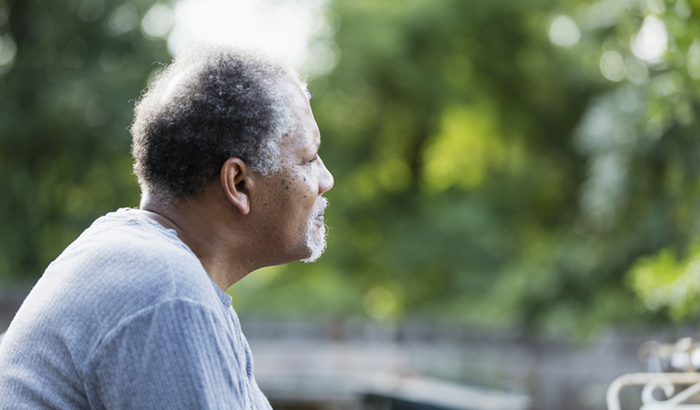Each week the monthly spotlight features a topic-related HSR&D study.
Military personnel face challenges during their tours of duty that can make it difficult to readjust to life back home. Many service members returning from duty in Afghanistan or Iraq experience symptoms of psychological distress, such as PTSD. Other issues may include stress, mood, anxiety, sleep, psychotic, and addictive disorders1. Fewer than 50 percent of returning Veterans in need receive any mental health (MH) treatment and the 2021 National Veteran Suicide Prevention Annual Report states that approximately 17 Veterans died by suicide every day in 20192. The National Institute of Drug Abuse reports that between 37 and 50 percent of Veterans returning from Afghanistan and Iraq have been diagnosed with a mental disorder associated with substance use disorders (SUDs) and that 63% of those diagnosed with SUDs also met criteria for post-traumatic stress disorder (PTSD)3.
Veterans face barriers to MH treatment, including stigma, shame, and lack of understanding, as well as logistical barriers such as long wait times and travel distances, and provider assumptions based on demographics. The National Veterans Foundation reports that many of the crisis calls counselors handle begin with issues of isolation and loneliness. Untreated, this can lead to substance abuse, relationship problems, and violent behavior4. Therefore, VA has made it a priority to ensure that Veterans have the needed MH treatment services available after they are discharged from the military and return home.
VA researchers are looking at potential new approaches for treating and preventing MH disorders. Investigators are working on projects such as developing and evaluating collaborative primary care models and improving access to services from rural and other remote areas by using the internet and other technologies. VA investigators are also looking at the co-occurrence of MH issues and physical disorders such as depression in those with spinal cord injury and substance use disorder in patients with chronic pain5. Below are examples of HSR&D funded research toward improving MH treatment for Veterans who receive VA care.

©iStock/Prostock-Studio
Implications:
This care model can be effective and should be considered among the interventions for improving medical care in patient populations with serious mental illness (SMI).
Overview:
People with serious mental illness (SMI), such as schizophrenia or bipolar disorder, have much worse health outcomes than the general population. They have high rates of hospitalization and emergency service use, but low rates of primary care. Primary care clinicians usually have limited training in treating SMI, and mental health-related stigma is prevalent. This project studied the implementation and effectiveness of a primary care medical home specifically designed to improve the healthcare of Veterans with serious mental illness. SMI PACTs (Patient Aligned Care Teams) include a specialized, integrated team that can provide both primary and psychiatric care. They apply VA principles of primary care mental health integration and PACT to SMI.
One VA medical center (VAMC) was assigned to the SMI PACT intervention and two VAMCs were assigned to continue with usual care (standard VA PACT care). Between May 2016 and February 2018, 331 Veterans with SMI were recruited (164 received the intervention, and 167 received usual care), and 39 clinicians and managers participated in the study. Patient interviews and administrative data at baseline and one year measured chronic illness care, care experience, preventive screenings, quality of care, symptoms, and quality of life.
Findings:
Principal Investigator: Alexander S. Young MD MSHS is an investigator with the Center for the Study of Healthcare Innovation, Implementation and Policy (CSHIIP), Los Angeles, CA.
Publications:
Young AS, Chang ET, Cohen AN, et al. The Effectiveness of a Specialized Primary Care Medical Home for Patients with Serious Mental Illness. Journal of General Internal Medicine. April 5, 2022; online ahead of print.

©iStock/LarsZahnerPhotography
Implications:
The products and outcomes resulting from this project will have tremendous potential to improve outcomes for medically complex older Veterans with chronic low back pain (cLBP) and comorbid depressive symptoms. Telephone and health coach delivery has potential to enhance access and reach of this intervention for many older Veterans who are mobility impaired. MOTIVATE, a health coach delivered behavioral intervention, could be integrated into existing care, to augment management provided by primary care, specialty and/or pain care services to improve outcomes in this vulnerable population.
Overview:
Depression and chronic low back pain (cLBP) often co-exist and result in challenging, complex management dilemmas, particularly among older adults. A feasible, effective behavioral intervention targeting cLBP and comorbid depressive symptoms, using a biopsychosocial approach, in older Veterans is sorely needed.
The goal of this study was to develop a health coach-telephone-delivered, behavioral intervention that will ultimately improve outcomes of pain interference and depressive symptoms in older Veterans with cLBP and depression. This research had 3 interrelated Specific Aims:
1) Develop a behavioral intervention for the target population of older Veterans with cLBP and depression.
2) Pre-test and refine the intervention in an iterative process.
3) Conduct a pilot randomized controlled trial to evaluate feasibility of study procedures and outcome measurement.
The intervention, Moving to Improve Pain and Depression in Older Adults (MOTIVATE), builds on prior interventions that promote self-management, goal setting, and patient activation, used for medically complex older adults. Investigators are focused on how older Veterans are uniquely motivated to make behavioral change and integrated motivational interviewing techniques throughout the sessions. Specific Aim 1 included interviews with experts, Veterans, and other stakeholder groups. This feedback was critical to ensure this intervention is relevant, feasible, and ultimately implemented within VA. In Aim 2, the intervention was delivered to 7 older Veterans who, along with other stakeholders, provided feedback on intervention content and delivery. The manual content and recruitment/intervention process was refined based on this feedback. In Aim 3 a pilot randomized controlled trial in 51 older Veterans assessed feasibility (enrollment rates, adherence, retention) for older Veterans with cLBP and depression assigned to receive the intervention versus the control group.
Preliminary Findings:
Next Steps:
Investigators are preparing an effectiveness/implementation trial to further evaluate MOTIVATE, now extending to broader musculoskeletal (MSK) pain conditions and depressive symptoms. Approximately 265 Veterans will be recruited in Dallas and Houston. Effectiveness as well as implementation processes and costs will be analyzed.
Principal Investigator: Una E. Makris, MD, MSc is a Staff Physician and clinical investigator with the VA North Texas Health Care System in Dallas, TX.

©iStock/kali9
Implications:
Veterans were highly engaged in the self-help intervention and reported numerous benefits while also experiencing decreases in psychological distress over time. Results suggest MEDIC offers a feasible and acceptable low-intensity, low-cost way to support Veteran mental health during crises/disasters.
Overview:
There is a paucity of research on evidence-based strategies that can be applied during disasters, especially for Veterans at-risk due to psychiatric disorders and not already engaged in specialty mental healthcare. This pilot evaluated a low-cost self-help intervention to improve mental health and indirectly reduce suicidality among at-risk Veterans during the COVID-19 pandemic. Building on prior work developing a mailed self-help intervention comprising evidence-based, cognitive-behavioral, self-management strategies, study investigators created the Managing Emotions in Disaster and Crisis (MEDIC) self-help intervention.
Specific aims of this study were:
Study investigators recruited 117 Veterans who either lived in a rural area or were in the Veterans Integration to Academic Leadership (VITAL) program and had a current diagnosis of major depressive disorder (MDD) or post-traumatic stress disorder (PTSD) but were not engaged in mental health treatment. Veteran participants received MEDIC materials consisting of 2 handouts detailing self-management strategies (description, rationale, and tips) per week for 4 weeks via their choice of delivery format - USPS mail or email. Veterans also had the choice to receive MEDIC materials only or opt in to receive additional support either in three individual phone calls with a care manager or three group phone calls with other participants led by a Veteran peer specialist. Mental health outcomes were assessed pre- and post-intervention and at 24 weeks follow-up. Feasibility and acceptability of MEDIC was assessed at post. Implementation costs in the form of staff time were measured.
Findings:
Principal Investigators: Jennifer S. Funderburk PhD, and Robyn L. Shepardson, PhD are investigators with the Center for Integrated Healthcare at the Syracuse VA Medical Center in Syracuse, NY.

©iStock/monkeybusinessimages
Implications:
This project includes several innovations: (1) targeting a high priority rural Veteran population with a history of military sexual trauma (MST), (2) obtaining input from Veterans and frontline community providers, and (3) novel use of community engagement and planning (CEP) strategies to address gaps in rural mental healthcare. CEP is a community-based participatory research approach designed to increase the capacity of community providers in delivering evidence-based care and building a community network of services.
Overview:
The 2018 MISSION Act allows Veterans to seek healthcare from non-VA providers through the Veterans Community Care Program (VCCP). However, shortages of mental health providers in over 50% of U.S. rural counties jeopardize access to psychological services in these areas. These shortages indicate a growing need to bridge gaps in the provision of mental healthcare in rural communities. The VCCP presents a distinct opportunity for VA to leverage its relationships with community stakeholders to develop innovative strategies to improve access to high-quality care for rural Veterans. Guided by VA’s state-of-the-art access model, this project seeks to understand the current state of VCCP mental healthcare and build a program that uses community engagement strategies to support community providers in delivering high-quality care to rural Veterans.
Veterans experiencing MST represent a high priority, understudied rural Veteran population. MST exposure is common among Veterans (25-33% of females, 1-3% of males) and associated with high rates of psychiatric distress and suicide risk. Preliminary data show that, despite equivalent rates of MST exposure, rural Veterans are less likely to receive psychotherapy than urban Veterans. This project will focus on rural Veterans who have experienced MST, as research on specific access barriers and gaps in mental healthcare for this vulnerable population is greatly needed.
Specific Aims:
Guided by the VA access model, Aim 1 will use qualitative interviews and secondary data analysis to examine VCCP mental healthcare for MST. Qualitative interviews with Veterans will explore perceived accessibility, quality, and satisfaction with this care. A secondary analysis of VA administrative and community care data will assess VCCP delivery and access outcomes including appointment wait time, session length, and duration. Aim 1 data will support an HSR&D IIR proposal by year 3 to conduct an in-depth evaluation of VCCP delivery of MST-related mental healthcare. These data will also inform development of the Enhancing Community Care for MST Program in Aims 2 and 3. The proposed program aims to support VCCP and other community providers in aligning VA and community resources to increase delivery of MST-related mental healthcare to rural Veterans. The program will educate community providers about evidence-based MST-related clinical practices and provide group consultation to facilitate their use of these practices. Group consultation will also include structured activities to assist providers in developing a collaborative community network of MST-related services. Aim 3 will pilot the feasibility and acceptability of the proposed program.
Principal Investigator: Derrecka M Boykin PhD, MA is an investigator with the Center for Innovations in Quality, Effectiveness and Safety (IQuESt) in Houston, TX.